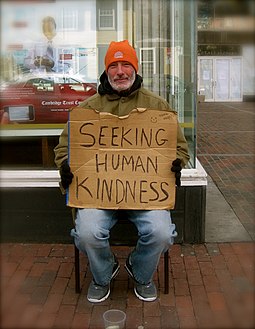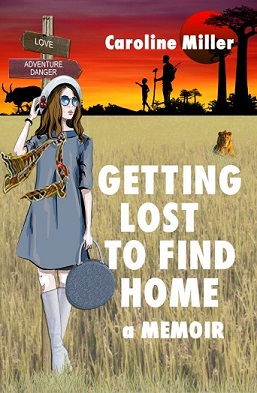
Courtsy of wikipedia.org
The podcaster interviewing me about my memoir, Getting Lost to Find Home sounded incensed. Why had I clung to my engagement plans for two years before admitting I was being jilted? “Couldn’t you see it coming?” the man asked.
His question wasn’t friendly, but it didn’t stop him from stabbing me with it a second time. My answer that I’d been deeply in love, didn’t satisfy him. ”His grunt said I was stupid.
If he hadn’t been the host and I a guest, I would have been more forthright. I’d have told him his question was meaningless. People raised in poverty, as I was, didn’t have much practice in foresight. What I remember about my youth was my mother’s constant worry that we’d have enough rice and beans in the cupboard for an evening meal. We lived from day to day like most poor people. Planning for the future was a middle-class idea.
Today, talking about a divided America is common. People blame the rancor on political differences. That reason doesn’t scratch the surface. What divides America and much of the world is money—an impenetrable barrier between those who have it in abundance, those who imagine they can grab more for themselves, and those who have lost hope.
About the superrich, Nick Carraway, the narrator In F. Scott Fitzgerald’s novel, The Great Gatsby, had this to say. Let me tell you about the very rich. They are different from you and me.
One difference is the way they treat money. Given the state of the world, that relationship strikes me as indecent. Gweneth Paltrow charges her clients $4,000 a night to sleep in a hotel room filled with her goop products. (“Being Gwyneth,” by Isiah Magsino, Town&Country, Dec. 2023/Jan. 2024 pg. 70) Kim Kardashian drops $10,000 to a coveted stylist for twisting her hair into a ponytail. (Ibid. pg. 54.)
How many impoverished children could eat for a year for the price of that ponytail? Nonetheless, that feminine vanity is penny-anty stuff. Consider the avarice of the sultan who is hosting the COP28 conference on climate change. He doesn’t believe the planet is in danger. What’s more, he’s using his platform to strike private oil deals with some of the countries in attendance.
Too much money causes people to lose their compassion. Without it, no bridge exists between the classes.
But is the Middle Class a repository of bleeding hearts? Not according to one study. The Middle Class has generated several myths to keep from falling prey to excessive empathy. Chief among them is that people lack money because they are lazy. Or, the economy is to blame. Sometimes, poverty is God’s will. One pejorative that didn’t make it into the study but which is common is that the poor have too many children.
People from the upper and Middle classes do give to charity but for a variety of reasons. Compassion may be one of them but a Stanford study says people contribute with an eye to tax credits. Surprisingly, egoism and narcissism are also motivators.
The poor contribute to good causes without the benefit of tax credits. Even so, they give a greater portion of their income to charities than the other classes. Perhaps the reason is they know the pain.
If philanthropy could both assuage conscience and lift people out of poverty, that would be a bargain. However, two studies of NGOs showed mixed outcomes. One report concluded these organizations provided important vehicles for empowerment, democratization, and economic development.” The other admited that NGOs created unintended negative consequences in the villages they entered, especially when the organization was replicating existing government services.
Because of their uneven performance, several poor countries have thrown the NGOs out. I, too, have mixed feelings about them. When I worked with charitable agencies in the 1980s, too often they resisted change, fearing an infringement of their turf.
We might make some progress in working with the poor if we acknowledged they aren’t stupid. They are poor for reasons beyond their control. No matter how hard a strawberry picker works in the fields, the individual will remain below the poverty line. My mother was one of those. A low-wage earner, her greatest luxury was a 10-cent lipstick from the five-and-dime. If stipends had been available in her day, she would have welcomed them. But she wouldn’t have needed a middle-class social worker to tell her how to spend that income.
The women of Umoja Uaso in Kenya are a good example of how the downtrodden can fend for themselves if barriers are removed. In 1990, fed up with genital mutilations, rapes, and beatings at the hands of the British army, some of the women who were treated as outcasts in their village formed a village of their own. No men were allowed. They sold arts and crafts and eventually, prospered. But the story doesn’t end there.
The men of their former village grew jealous and established a craft colony nearby. They did their best to discourage tourists from visiting the women’s village, but the strategy failed. The weaker sex was too good at their work. Eventually, the women of Umoja bought the men out.
December is the season of giving and I’m all for it. We could begin by eliminating the excuses people make to discriminate among the classes. If we want peace on earth, money must flow equitably through an economy. Let’s admit that $10,000 ponytails are obscene. If we share the wealth through fairer tax laws, for example, the country would experience greater harmony.
I’m not alone in my thinking. Former Supreme Court Justice Louis Brandis said it best. We can either have democracy in this country or we can have great wealth concentrated in the hands of a few, but we can’t have both.
———————–
Review from Midwest Book Review for Getting Lost to Find Home, December 2023
Critique: Fascinating, thought-provoking, entertaining, and ultimately inspiring, “Getting Lost to Find Home: A Memoir” by Caroline Miller will have a particular relevance for readers with an interest in friendship stories and American memoirs set against a background of mid-to late 20th Century Africa. While an extraordinary and unreservedly recommended addition to community and college/university library American Biography/Memoir collections, it should be noted for personal reading lists that “Getting Lost to Find Home: A Memoir” is also readily available in a digital book format (Kindle, $5.99).

